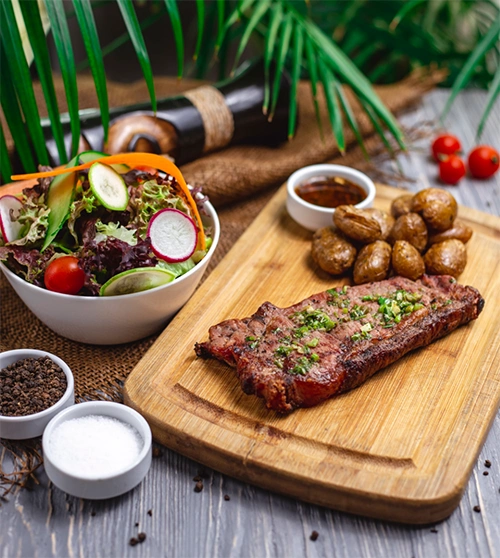

Top Health Benefits of Ostrich steak You Need to Know
Ostrich steak is a nutritional powerhouse, offering a remarkably high protein content with significantly lower fat compared to traditional red meats like beef or lamb. Rich in iron, zinc, and vitamin B12, ostrich meat supports muscle growth, energy production, and immune function. Combined with roasted baby potatoes, which provide complex carbohydrates and dietary fiber, this meal offers sustained energy release without spiking blood sugar levels. The use of herbs, garlic, and olive oil not only enhances flavor but also contributes anti-inflammatory and antioxidant properties. This dish is particularly well-suited for individuals looking to increase lean muscle mass, maintain a healthy weight, or manage blood sugar while still enjoying a satisfying, hearty meal.
Recipe :
For 4 people
Enjoy a restaurant-quality, healthy meal at home that's rich in protein and bursting with flavor!
When preparing ostrich steak, it is crucial to remember that the meat is very lean and can dry out quickly if overcooked. Unlike beef, ostrich should ideally be cooked to medium-rare or medium to preserve its natural tenderness and juiciness. Marinating the meat for at least a couple of hours—preferably overnight—with olive oil, herbs, and a mild acid like lemon juice or vinegar helps to enhance its flavor and texture. Allowing the steak to come to room temperature before cooking ensures even heat distribution, while a quick sear on high heat locks in juices. Roasting baby potatoes with their skins on preserves their nutrients and adds a pleasant texture. Resting the steak for a few minutes after cooking is essential to allow the juices to redistribute. Avoid using heavy sauces that might overpower the delicate flavor of ostrich; a light herb gravy or jus is sufficient to elevate the dish.

This dish aligns well with several health-conscious and specialized diets. It is an excellent fit for ketogenic, paleo, gluten-free, high-protein, and low-calorie diets due to its high protein content and minimal carbohydrates—especially if the potatoes are reduced or replaced with non-starchy vegetables. The meal is unsuitable for vegan and vegetarian diets, as it is centered around animal protein. While the Mediterranean diet encourages lean meats, the inclusion of ostrich, olive oil, and herbs makes it a viable, albeit less traditional, component. For individuals following the DASH diet, it's important to monitor sodium levels in the marinade and seasoning. Those observing intermittent fasting may enjoy this meal as a nutrient-dense option for breaking their fast. However, the dish is not recommended for individuals strictly avoiding animal products or those on very low-protein therapeutic diets.
jim9-h (April 13, 2025, 1:35 a.m.) : I had never cooked ostrich before, but this recipe was so easy to follow—and the flavor was incredible! Tender and juicy!
Fatima (May 24, 2025, 5:04 p.m.) : Ostrich steak is such an underrated gem! definitely a great alternative to beef. The rosemary and garlic in this marinade bring out its natural richness beautifully. I’ve also tried it with a red wine reduction instead of herb sauce, and it was a great match!